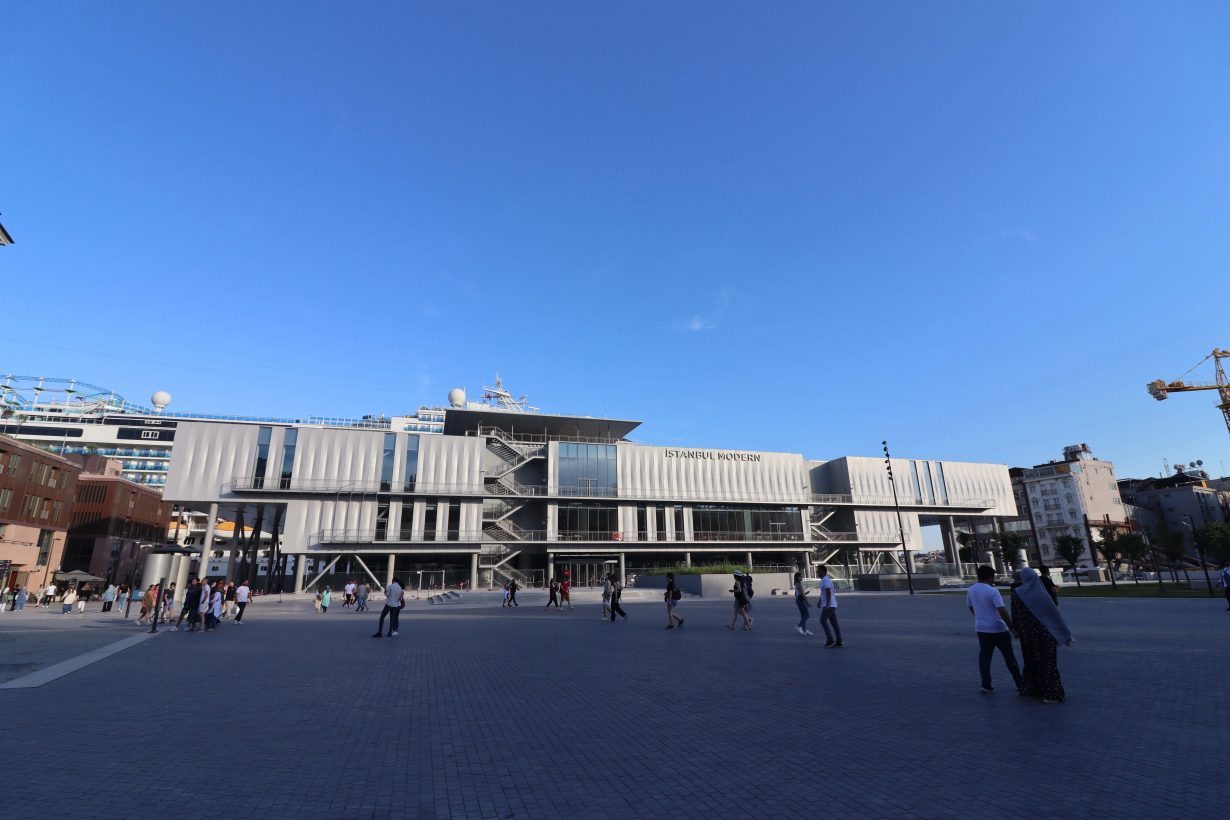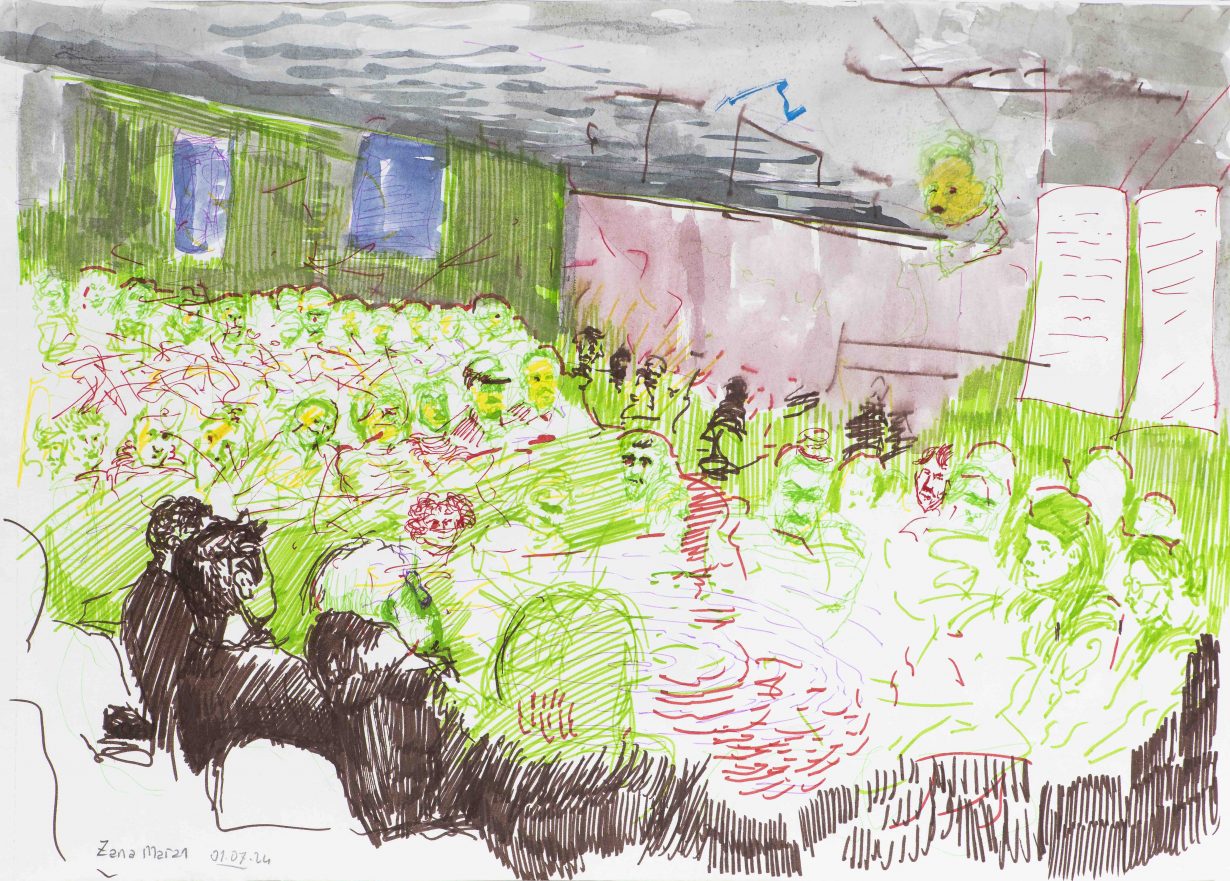An update on revolt, discussions and developments in the city following months of crisis
Over the past six months, Istanbul’s art scene has been in a state of deep crisis. Leaders of top cultural institutions, including the Istanbul Biennial and the Istanbul Modern, have left their posts. Grassroots demands for transparency and accountability have surfaced through a flurry of public protests and forums. On streets, in meetings and in Google forms, Turkey’s culture workers have undertaken a radical interrogation of how their field operates, attempting to reclaim what were once progressive institutions and refusing interventions from invisible actors.
The crisis that began last summer has galvanised Istanbul’s cultural scene, which only months ago seemed destined to experience an era of increased self-censorship and silent obedience. In the wake of the May 2023 parliamentary and presidential elections that paved the way for Turkish strongman Recep Tayyip Erdoğan and his far-right coalition partners to rule Turkey with an iron fist for another five years, this rise of dissent is significant and promising. The mood is reminiscent of the heady days of 2013’s Occupy Gezi events.
In August 2023, reports in anglophone outlets exposed a series of problematic behaviours in the selection process of the curator of the 2024 edition of the Istanbul Biennial, sparking universal dismay. People learned, seven months after the fact, that the board of Istanbul’s Culture and Arts Foundation (İKSV) had refused to appoint Defne Ayas, the curator chosen by the advisory committee, and instead picked one of the advisory committee members, Iwona Blazwick, to be the curator, for reasons that remain unclear to this day. Unbeknownst to the public, this also led to the resignations of advisory committee members Agustin Pérez Rubio, Selin Ansen and Sarkis. Blazwick has kept silent since.
In October, an ‘Open Letter to İKSV’ called on the institution to respond to criticism, asking, among other questions, ‘Why has the public not been informed of how the curator selection took place?’ In its response, İKSV claimed it always pays ‘close attention to opinions and commentary in the culture and art world about our activities’ and announced changes to the regulations of the Istanbul Biennial advisory board. But despite these minor improvements, İKSV said that the ‘preparations for the 18th Istanbul Biennial, to take place in 2024, continue as planned’.
The announcement didn’t go down well. In October, four artists – Bengü Karaduman, Ateş Alper, Kerem Ozan Bayraktar and Yaşam Şaşmazer – who were invited to participate in the biennial’s 2024 edition, announced they were pulling out. ‘Due to the direct impact this situation has on our work and the responsibility we feel towards the art community, we have decided not to participate in the 18th Istanbul Biennial. We hope that our decision will contribute to the promotion of artistic freedom, the establishment of transparent and inclusive institutional cultures that encourage criticism, and the creation of a dialogue platform in this regard,’ the artists said in a joint statement on Instagram. Soon after, Istanbul Biennial director Bige Örer left her post. The appointment of Kevser Güler, a forward-looking curator whose previous work includes collaborations with radical artists including Nilbar Güreş and Deniz Gül, has been widely welcomed since the news was announced on 5 January.
There was a protest march in November 2023, where activists posted job advertisements on walls of Urban, a meeting point of Istanbul’s art scene, for an ‘unqualified curator for the next Istanbul Biennial’. In December, there was a sit-in outside Istanbul Modern to protest the recent shortening of the hours of the museum’s free access day (Istanbul Modern is free for Turkish citizens on Thursdays between 10:00 am and 2:00 pm). Artists carried an eight-metre snake prop, sang and danced while delivering to the museum staff over 5,500 collected signatures demanding the reinstatement of free access for a full day and the transparent disclosure of institutional information about the museum.

Levent Çalıkoğlu, the chief curator of Istanbul Modern, resigned in August, weeks after the museum he has led for years opened its new Renzo Piano–designed building. The reason for Çalıkoğlu’s exit has never been made public. Turkish culture journalist Çağdaş Ertuna reported in Milliyet that Çalıkoğlu has resigned because of ‘differences in principles concerning acquisitions’. In response to my query, Istanbul Modern said: ‘Levent Çalıkoğlu served as General Director of the Istanbul Museum of Modern Art for 11 years (2012–2023), and he stepped down from his position on 30 September 2023. We are currently in the process of searching for a new museum director and will keep you informed once a suitable candidate is selected.’
Changes have happened on the Venice Biennale front, too. Esra Sarıgedik Öktem, who runs Büro Sarıgedik Gallery, was picked to curate the Turkish pavilion, which will show the work of Gülsün Karamustafa. Öktem resigned in August after acknowledging a conflict of interest (she is Karamustafa’s long-time dealer). The Venice pavilion is also commissioned by İKSV with the contribution of the country’s Ministry of Culture and Tourism and under the auspices of the Ministry of Foreign Affairs. Even with this resignation that came in the same month of Çalıkoğlu’s unexplained exit, the opacity in Turkey’s cultural institutions continues.
Some may argue it is becoming more widespread. Kurdish artist Halil Altındere said in a recent interview that the ‘unexplained developments’ at Istanbul Modern were ‘far worse’ than the Istanbul Biennial crisis, suggesting that ‘the transparency demanded from İKSV should be demanded from Istanbul Modern, too’. Similarly, Kültigin Kağan Akbulut, who runs the pro-LGBTQIA+ art journal Argonotlar, said his team had hit a wall when they tried to report on the story. Nobody would talk on the record. ‘There was no formal press release about the exit. The museum only sent a statement to its golden members.’ The artist Aslı Çavuşoğlu laughed as she remembered a conversation with a novelist friend. “He called the whole thing ‘worthy of a novel. A tale everyone knows, but nobody can write down.’” Çavuşoğlu said the opacity crisis of the art world reflected Turkey’s political culture: “We’re seeing the Turkish government’s way of doing things in the microcosm of institutions. Whatever they say, goes.” She characterised the country’s art establishment as “a group of people desperate to enjoy a last expensive meal inside a waterside mansion on the Bosphorus, as Turkey sinks under water”.
The spirit of resistance ignited by the latest events has shown no sign of dimming. On 7 January, a forum titled ‘From Here to Where? The Case of the 18th Istanbul Biennial’ was organised at Bahçe Galata, a performance and theatre venue. Despite the pouring rain outside, around 120 people converged in the space. The group spent four hours recounting personal experiences, listing irregularities at art institutions and discussing strategies and possible solutions. Two artists who pulled out of the Biennial were present, as were culture workers from the British Council, Istanbul Modern, SALT and other institutions. There were film directors whose works have been pulled from festivals for political reasons; the journalist who broke a censorship story at the Turkish Pavilion in 2015’s Venice Biennial; and numerous progressive artists, including Banu Cennetoğlu, Zeyno Pekünlü and Marina Papazyan. Merve Elveren, from the Open Letter initiative, was one of the moderators. Each speaker was invited to talk for two minutes. Mansplaining was banned. So was hate speech directed at LGBTQIA+ and migrant communities. Beral Madra, who curated the first two editions of the Istanbul Biennial (1987 and 1989) and has curated five of the Turkish Pavilions at the Venice Biennale, urged the formation of an association for like-minded culture workers to better defend their rights. Among the strategies proposed in the forum were a boycott, a database of artistic malpractices, the formation of a union and more street protests. For a community now experienced in protest, these suggestions have become part of daily life under Erdoğan’s government.

Asena Günal, the general coordinator of Depo, a former tobacco warehouse that has served as a refuge for critical voices in Istanbul’s cultural landscape since 2008, issued a note of caution. Günal was detained in 2018 as part of Erdoğan’s crackdown on all the progressive actors in Turkey’s art scene. Her employer at Depo, cultural philanthropist Osman Kavala, has now been imprisoned for over six years. In 2022, Kavala was convicted of trying to overthrow the government by financing 2013’s Gezi protests and received a whole life sentence, harsher than sentences imposed on murderers. Günal warned against comparisons between İKSV and the Turkish state, pointing to the risk of that comparison resulting in a premature sense of defeat. “People can still try to establish a public debate about İKSV”, she said. “We are here because we feel we can force some people in İKSV to do things differently.”
This proposal is intellectually and emotionally constructive. Antagonising İKSV wouldn’t be beneficial for the artistic community in the long run. And there is still room for optimism here: İKSV’s administrative staff supported protests against Kavala’s imprisonment, joined visits to Silivri Prison where he is held and publicly declared their solidarity. Despite the continuing opacity at institutions, a younger group of majority-women arts professionals are now given the power to steer places like the Istanbul Biennial and Istanbul Modern in a progressive and transparent direction. Hopefully, under their leadership, these institutions can learn from past mistakes – by honestly and wholeheartedly acknowledging them first.
Kaya Genç is a journalist and novelist from Istanbul. The paperback edition of his most recent book, The Lion and the Nightingale: A Journey Through Modern Turkey, featuring new material on the latest Turkish presidential election, will be published in May.
